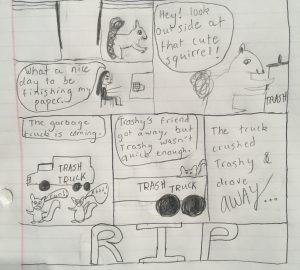My life used to revolve around hitting my twin brother when he upset me, eating chicken noodle soup, and playing with stuffed animals. My biggest worry in life was my mom being five minutes late to picking me up. If my few desires for fun, food, and revenge were fulfilled, I was happy. It’s not that there wasn’t corruption around me, it’s just that I was too naive to realize. Being unaware of the world I lived in meant I didn’t have very much to worry about. Did this innocence make me happier than I am now?
Today I wake up to a dark, rainy cloud outside my window, representing the depression at the future of America because we just elected Donald Trump. How can I be happy when I am aware of the fact a racist, sexist, misogynist, criminal is going to be in charge of my home country? Instead of only thinking about chicken noodle soup and Spongebob Squarepants, I’m thinking about chicken noodle soup, Spongebob Squarepants, and the horrific backlash to decades of social progress. Just when gay marriage became legal, planned parenthood was gaining approval, and a qualified woman was actually about to be taken seriously, it all backfired.
As nice as it was to be a little kid who didn’t know what the word corruption meant, I’m grateful to have an understanding of it in this day and age. This means that I can utilize my opportunity to be educated and fight the corrupted authority that is taking over the world. I want to stand up for women’s rights, LGBT rights, disabled rights, immigration rights, and everything in between. Without awareness of how screwed up the world is I would not be able to stand against it. As angry and unhappy and frustrated as I am now, it is worth it if I can contribute even the slightest bit of progress to a society of hatred.
I agree with Rousseau that property and inequality drove us into this deep corruption, but I have trouble figuring out what he would want us to do right now. There is no chance of America returning to our ‘natural state’, just as there is no chance of me returning to my innocent childhood state, instead we must move forward. It is impossible to take away property and dominance and all the factors that contribute to inequality, so it’s time to get creative.
I will use my anger as fuel to change the racist, sexist, and ableist systems that control society. While I may have been ‘happier’ 15 years ago, I would not have been capable of joining the movement against hate and for equality. My awareness of the world grants me the potential to make a difference, and I think that is more satisfying than being a kid who has no worries.

